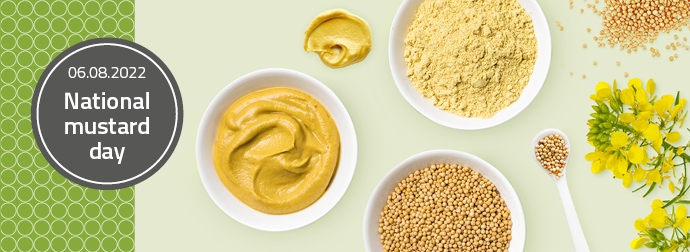
Mustard
Reliable tests for the detection of mustard in food
- Home
- /
- Analytes
- /
- Food allergens
- /
- Mustard
Mustard
Mustard allergy and regulatory requirements
In the EU and several other countries, mustard is one of the 14 allergens that must be labeled as an ingredient in food products. Mustard allergy is particularly common in countries like France, Spain, and India.
Allergenic Proteins in Mustard
Mustard seeds contain over 20% proteins, some of which have allergenic effects. Sensitive individuals can react to even small quantities of these allergens. Symptoms of mustard allergy include:
- Skin rash
- Swelling
- Shortness of breath
- Asthma
- Stomach ache
- Nausea and vomiting
- Anaphylactic shock
Affected individuals must avoid all foods containing mustard.
Common Foods Containing Mustard
Mustard is a popular condiment found in various foods, including mayonnaise, sauces, salad dressings, ketchup, marinades, pickles, sausages, and meat products. It is widely used in French, Italian, and Russian cuisines, and mustard seeds and mustard oil are staples in Indian cuisine. Interestingly, some individuals with mustard allergy do not exhibit cross-sensitivities to other foods like fruits or nuts.
Labeling and quality assurance challenges
Significant shortcomings in labeling and quality assurance often lead to undeclared traces of mustard in food products. Cross-contaminations can occur during processing (e.g., dust formation during grinding) or packaging. Effective allergen management requires thorough hygiene control of production surfaces to ensure complete and sufficient cleaning. Rapid tests such as lateral flow tests (immunochromatographic test systems) are highly suitable for checking surfaces for allergenic contamination as part of an HACCP concept.
Heat-stable allergenic proteins
The key allergy-triggering proteins in mustard are heat-stable, meaning their allergenic effect is not diminished by processing. Therefore, it is crucial to use test systems capable of detecting processed mustard proteins to ensure comprehensive allergen control.
Key benefits of monitoring mustard allergens
- Consumer safety: Protects individuals with mustard allergies from potentially severe allergic reactions by ensuring accurate detection and labeling of mustard allergens in food products.
- Regulatory compliance: Helps manufacturers comply with food allergen labeling regulations, such as those mandated in the EU and other countries, ensuring that all mustard-containing products are properly labeled.
- Quality assurance: Maintains the integrity and safety of food products by accurately identifying and quantifying mustard allergens, preventing accidental exposure.
- Cross-contamination prevention: Ensures that food production environments are free from mustard allergens, preventing cross-contamination and ensuring the safety of allergen-free products.
- Advanced detection methods: Utilizes highly specific real-time PCR techniques and other advanced methods to accurately detect and quantify mustard traces, even in processed foods.
Conclusion
Monitoring for mustard allergens is essential for protecting consumer health, ensuring regulatory compliance, and maintaining product quality. By employing advanced detection methods such as real-time PCR, manufacturers can accurately identify and quantify mustard contamination, preventing allergic reactions and ensuring the safety of their products. This proactive approach supports robust allergen management, upholds food safety standards, and fosters consumer trust in mustard-free products.
Product portfolio
| Product | Description | No. of tests/amount | Art. No. |
|---|---|---|---|
| RIDASCREEN®EASY Mustard |
RIDASCREEN®EASY Mustard is an enzyme immunoassay for the quantitative determination of mustard. Read more |
Microtiter plate with 96 wells (12 strips with 8 removable wells each) | RAE8201 |
| Product | Description | No. of tests/amount | Art. No. |
|---|---|---|---|
| bioavid Lateral Flow Mustard incl. Hook line |
The Lateral Flow Mustard (Art. No. BLH703-15), with included hook line from bioavid, is an immunochromatographic test for the sensitive and qualitative detection of mustard residues on surfaces (e.g. swab test for the hygiene control in food … Read more |
15 test strips (15 determinations) | BLH703-15 |
| Product | Description | No. of tests/amount | Art. No. |
|---|---|---|---|
| SureFood® ALLERGEN Mustard |
The SureFood® ALLERGEN Mustard is a real-time PCR for the direct, qualitative and / or quantitative detection of specific white mustard (Sinapis alba), indian mustard (Brassica juncea) und black mustard (Brassica nigra) DNA sequences according to … Read more |
100 reactions | S3609 |
| SureFood® ALLERGEN 4plex Soya / Celery / Mustard + IAC |
The SureFood® ALLERGEN 4plex Soya / Celery / Mustard + IAC is a multiplex real-time PCR for the direct, qualitative detection and differentiation of specific celery (Apium graveolens), mustard (Brassica carinata, Brassica juncea, Brassica nigra, … Read more |
100 reactions | S3401 |

